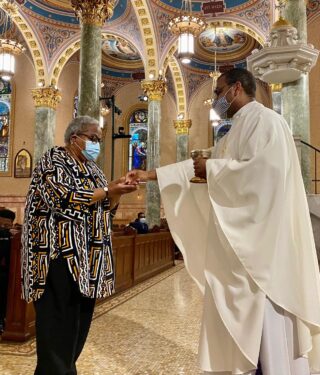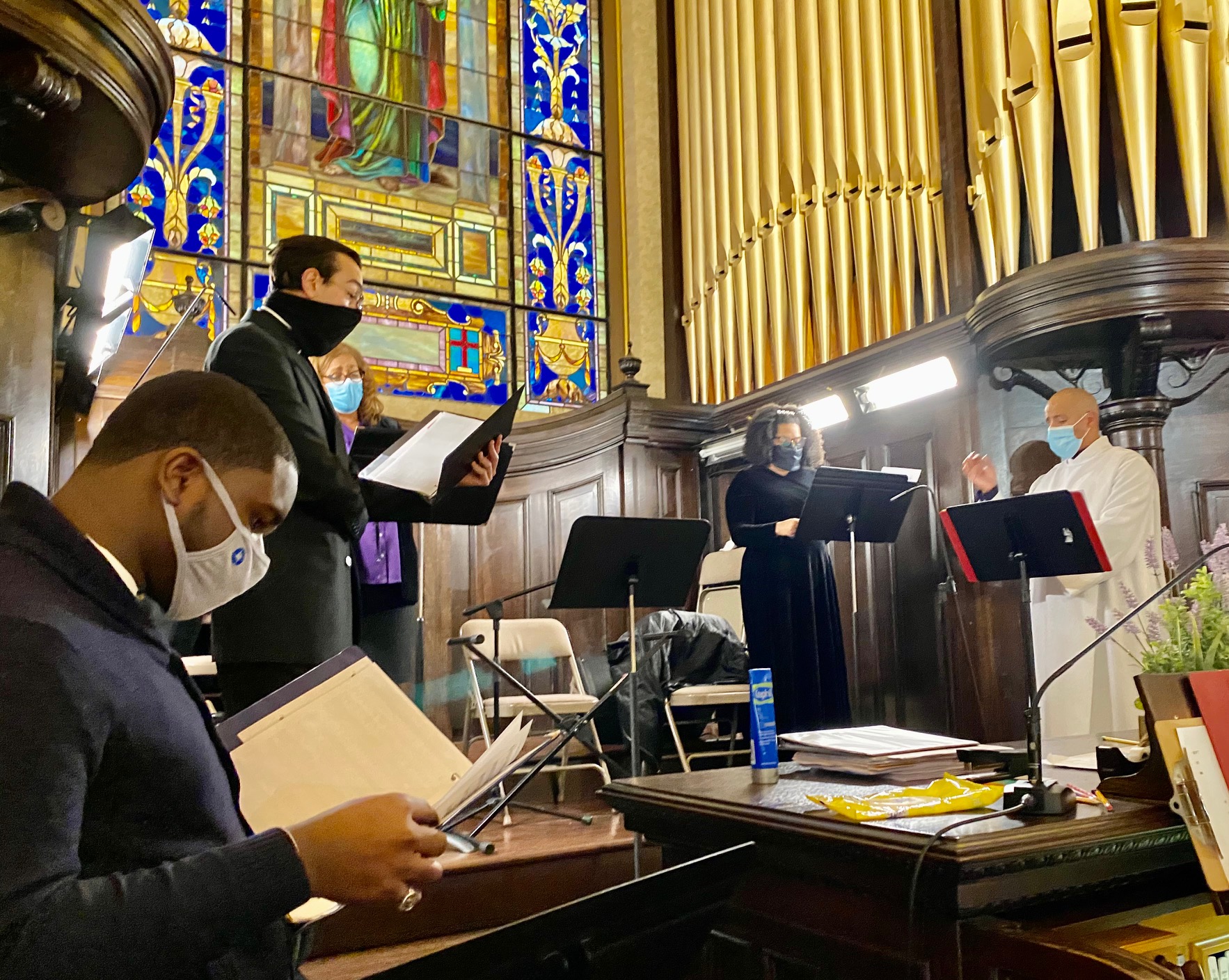Click the video above to watch the full homily from Father Franklin Ezeorah.
PROSPECT HEIGHTS — Injustice has plagued Black history in the United States. Still, the people’s sacrifices helped win breakthroughs for the community, a priest said Sunday at the annual Black History Month Mass.
But Father Franklin Ezeorah, during his homily, also said more sacrifices are needed to achieve justice for all, and Christians must lead the way.
[Click here to read the full homily by Father Franklin Ezeorah]
“It is time for the church to act as the moral conscience of the world to bring about lasting peace and tranquility not only in American society but in the world,” Father Ezeorah said.
Bishop Nicholas DiMarzio was the main celebrant for the Mass, held this year at the Co-Cathedral of St. Joseph, Prospect Heights. Moments before the event, he commented how the COVID-19 pandemic has been particularly harsh to the black community.
“We know how difficult this has been for people of color to survive in this atmosphere,” Bishop DiMarzio said. “We see the inequality that seems to show itself at these times when they don’t have the same access to medical health care like many other people do. So it’s all part of the history of a suffering people.
“History repeats itself, it seems.”
However, Bishop DiMarzio said the people still managed to thrive, especially in Brooklyn, home to African Americans, people of the Black Caribbean heritage, and new immigrants from Africa.
“We probably have more black Catholics than any diocese in the country,” he said.
Father Ezeorah, who is from Nigeria, went a step further to say the Diocese of Brooklyn is “arguably the most diverse in the U.S. because of its openness to welcoming immigrants.”
“The credit goes to you, Bishop DiMarzio, and your collaborators for realizing there is strength in diversity,” he added. “We essentially embrace diversity because although we have different people globally, we have only one human race.”
Father Ezeorah, who is the parochial vicar for St. Martin de Porres Parish, Bedford-Stuyvesant said Black History Month highlights breakthroughs and motivates to keep “forging ahead even in the face of daunting oppositions.”
He recounted the legacies of Civil Rights leader Dr. Martin Luther King, Jr. and South African President Nelson Mandela. He also told of Jane Matilda Bolin, a New York City lawyer who, in the 1930s, became the first black female judge in the U.S.
All made personal sacrifices in the pursuit of a just society for everyone, Father Ezeorah said.

“Dr. King,” he said, “had to die for the course he believed. Nelson Mandela had to endure imprisonment for 27 long years in order to secure the freedom of South Africans who were being segregated.
“Jane Bolin had to work extra hard to reform our prisons and to minimize the plight of children who were profiled in detention facilities.”
Other examples are in the Bible. Father Ezeorah pointed to the Gospel reading for the Mass (Mark 9:2-10) that describes the Transfiguration of Jesus in the company of Moses and the Prophet Elijah, with apostles Peter, James, and John as witnesses.
“The appearances of Moses, Elijah, and Jesus are symbolic,” Father Ezeorah said. “Three men who fasted 40 days and nights; three men who spent a significant part of their lives fighting injustice and discrimination, and largely prevailed over them; three men who defied death by their mysterious endings.”
Father Ezeorah also referenced Abraham’s example in the first scripture reading for the Mass (Genesis 22:1-2, 9a, 10-13, and 15-18). The verses recount how Abraham, at God’s command, faithfully but grievously prepared his son, Isaac, to be sacrificed.
“It is only meant to be a test of faith,” Father Ezeorah said. “God does not want an innocent boy to be killed. Instead, he wants to ban the practice of human sacrifice in a dramatic and explicit manner because his son (Jesus) would go ahead and pay the price once and for all.”
A more recent example, albeit nearly 100 years ago, is Msgr. Bernard Quinn, the son of Irish immigrants and now a candidate for sainthood. He was ordained in the Diocese of Brooklyn. In 1922, he founded St. Peter Claver Church for Black Catholics, one of three congregations that today comprise St. Martin de Porres Parish.
“Msgr. Quinn was a good example of resilience in the face of opposition,” Father Ezeorah said. “He remained undaunted in his resolve to improve not only the relationship of the church with African Americans but also to improve their quality of life.”
“That is the role of the church,” he added. “Msgr. Quinn stopped at nothing in accomplishing this task, including funding an orphanage for the number black children who became orphans during the Great Depression, despite attacks from the Ku Klux Klan.”
Sacrifices made by the modern-day Catholic may not be as dire as these examples. However, sacrifices are still needed, Father Ezeorah said.
“God wants us today to avoid human maltreatment and think of some other sacrifices to ensure equality in the world,” he said
“As Abraham was willing to sacrifice his only son, Isaac, and God was willing to sacrifice his only son, Jesus, are we willing to sacrifice our wealth for works of charity?” he asked. “Are we ready to embrace the sacrifice of practicing works of mercy?”
Such actions can promote unity in the church, society, and throughout the world, Father Ezeorah said.
“The contributions we make to foster unity can be incremental or massive, but we have to keep doing something,” he said. “We cannot sit down with virtually folded arms waiting for things to get better.
“Against this backdrop, Martin Luther King once advised, ‘If you cannot fly, then run; if you cannot run, then walk; if you cannot walk, then crawl.’
“That is how God’s kingdom flourishes. We must do our part and allow God to do his.”

About 40 people attended the Black History Mass. As many as 200 generally come to the event, but coronavirus safety protocols limited attendance, said Father Alonzo Cox, pastor of St. Martin de Porres Parish. He also is the coordinator of the Vicariate of Black Catholic Concerns for the diocese.
Father Cox said it was important to celebrate this Mass, despite the pandemic restrictions, especially after a turbulent 2020 marked by massive social unrest across the nation.
“So, we pray for harmony today,” he said, “that all of us will continue to live together, created in the image and likeness of God, and that we would live together in peace and equality.”
After the Mass, Joan Davenport, a member of St. Martin de Porres Parish, praised Father Ezeorha’s homily.
“He called for accountability from the church, accountability from the clergy, and accountability with our own selves,” she said. “It was profound and courageous.”
